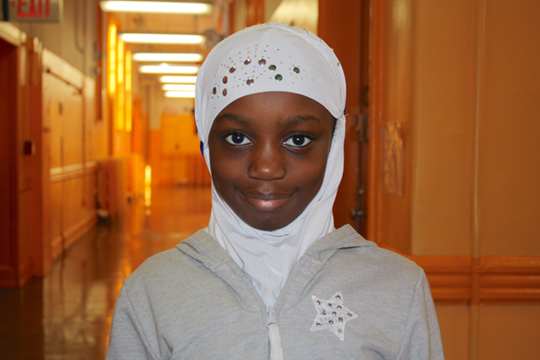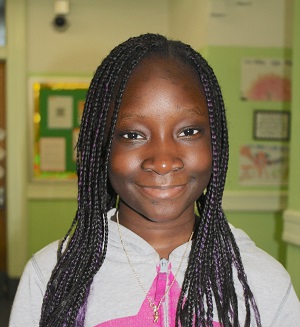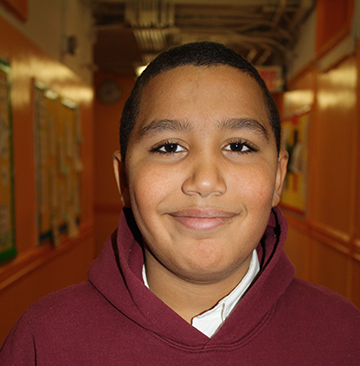Wasila is ten years old and in the fifth grade in a New York City public school in the Bronx, where she lives with her parents and five brothers. This winter she was in a creative writing class taught by T&W teaching artist Ibi Zoboi. She spoke with Susan Karwoska on a cold and windy January day in early 2016 about writing, reading, and the royal title she claims.
***
Teachers & Writers: I hear from your teacher that you have declared yourself “The Queen of Figurative Language!”
Wasila: Yes—I call myself that! I like using similes, metaphors, personification, and descriptive details and things like that. They make writing more fun, and then people have more fun reading it.
T&W: What else do you like about writing?
Wasila: I like how it makes me feel warmed up inside and lets me share my feelings and my everyday life with other people. I like sharing my poems with Miss Ibi and discussing and revising them.
T&W: What kinds of things do you like to write about?
Wasila: Well, sometimes I write about disappointment. I’ve written a lot of sad stories in class. I wrote a story about a girl who was lost in the forest with three friends. It has a sad ending. But I like to write funny things too.
T&W: I hear you enjoy reading too. What kinds of books do you like?
Wasila: Biographies.
T&W: Maybe you’ll write a biography someday.
Wasila: I’d like to! I’d like to write a biography of Rachel Carson, because she was a writer and I want to be a writer too. And if you learn how to write poems and stories as a kid, when you grow up you’ll still know how!
***
Walking Home from School
By Wasila
I see
people with umbrellas
running and getting wet
drizzling and foggy
and DARK
the wind is strong
cold like winter
L I G H T N I N G
as loud as thunder
houses with their doors closed
trees swishing back and forth
I’m at home
panting and really tired
The shiny silver gate
opens as I walk in
I ring the doorbell
Ding! Dong!
and I go in
I smell
white rice and brown soup
I see
the enormous kitchen
full of steam
I feel
the fluffy, soft rug
beneath my toes
I hear
the loud wail of a baby
in a pink and green carriage
I go into my room
I am really s
l
e
e
p
y
***
Lesson Notes
By Ibi Zoboi
On the very first day of my residency, I learned that Wasila is the “Queen of Figurative Language.” This is what she wrote on her name tag, and her teacher confirmed that this what she calls her. She has certainly lived up to that title.
Wasila’s poem was inspired by Eloise Greenfield’s poem, “Riding on the Train.” This poem was the starting point for a lesson I taught on using imagery and sensory details to create what I called a “moving poem.” After we read the poem together, I asked the students to choose one of four starting points for their moving poem: walking home from school or riding in a car, train, or bus. We then closed our eyes and imagined ourselves in one of these settings. I asked the students to pay attention to everything they saw, heard, smelled, felt, and tasted. I told them to be as specific as possible in describing these things.
At the very end of Greenfield’s “Riding on the Train” is the word “sleepy” written in a downward slant. We discussed why the poet chose to write the word this way. We all agreed that the word sleepy was also getting sleepy. I asked the students to do the same. But in order to do that, I told them, we would have to fill our moving poems up with so much sensory detail that both the poet and the reader would certainly feel sleepy after writing or reading the poem.
Wasila took more creative risks with her poem than any of my students. Although it’s not visible in this version, Wasila chose to emphasize the words “dark” and “lightning” by darkening the letters and making the letters look like lightning bolts. She also chose to use the most dramatic setting to convey strong sensory details—a rainstorm. She ends her poem at home, where she highlights the smell of cooked food, the way the rug feels beneath her feet, a baby’s cry, and finally feeling sleepy. In class, I told her that she was being very intentional about her setting, and this made it much easier to capture the imagery in her poem. For example, by choosing a rainy day over a sunny day, she had the opportunity to describe how it feels to be wet, windy, cold; and how it sounds to hear trees swaying and raindrops on umbrellas. Wasila is indeed a queen of figurative language.
Ibi Zoboi's short stories have been anthologized in Dark Matter: Reading the Bones, Haiti Noir edited by Edwidge Danticat, and The Caribbean Writer, among others. She’s received grants in Literature & Writing from the Brooklyn Arts Council and is a winner of the Speculative Literature Foundation Travel Award. Ibi is an MFA student in Writing for Children & Young Adults at Vermont College of Fine Arts.



